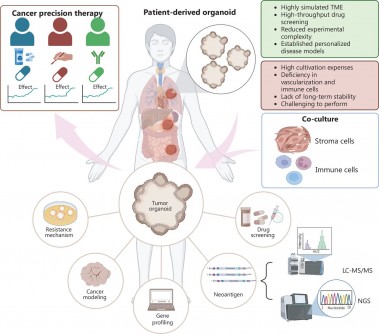Science
Organoids Revolutionize Cancer Research and Personalized Therapy

Research from Peking University People’s Hospital highlights a significant leap in cancer treatment through the use of organoid models. Published in the journal Cancer Biology & Medicine, the review emphasizes how these models can effectively mimic human tumors, potentially transforming personalized cancer therapy.
For years, cancer research has faced challenges with traditional models that do not accurately represent the complexities of human tumors. Flat cell cultures often lose essential genetic characteristics, while animal models can be costly and biologically different from humans. This gap has contributed to high drug failure rates and slow advancements in personalized care. The research community is now increasingly turning to organoid models as a solution.
Organoids are derived from patient tumor tissues or stem cells, preserving the genetic mutations and surrounding microenvironments found in actual tumors. This method maintains tumor heterogeneity, which is especially crucial in cancers such as colorectal and gastric. Studies have shown that drug response testing using organoids often mirrors clinical outcomes closely, offering a more reliable means of evaluating potential therapies.
Advancements in Cancer Research
The rise of organoid technology has opened new avenues for cancer research. Researchers can use organoid co-cultures with immune cells to develop and assess therapies like checkpoint inhibitors and CAR-T cell treatments. These experiments link laboratory findings directly to patient survival outcomes, enhancing the understanding of how various treatments might work in real-world scenarios.
Recent technological innovations further amplify the capabilities of organoids. Microfluidic “organoid-on-a-chip” systems simulate complex biological processes like metastasis, while techniques such as proteomics and single-cell sequencing help in identifying hidden signaling pathways and clonal diversity. Together, these advancements provide unprecedented insights into tumor biology.
Importantly, organoids are not restricted to validating treatments. They also play a vital role in vaccine development, allowing researchers to screen antigens while preserving tumor-specific characteristics and simulating immune responses in laboratory settings. By integrating patient-derived biology with advanced technologies, organoids pave the way for more individualized treatment strategies in oncology.
Dr. Kezhong Chen, the senior author of the review, stated, “Organoids have transformed the way we approach cancer research. They allow us to study tumors as living ecosystems, capturing both genetic complexity and immune dynamics. This means we can test therapies in conditions far closer to reality and predict how individual patients might respond.”
The Path Toward Precision Oncology
The implications of organoid research extend from laboratory settings to clinical applications. Clinicians can leverage organoid models to make informed therapy choices, reducing the likelihood of patients being exposed to ineffective treatments. This research not only aids in understanding drug resistance but also assists in the identification of biomarkers with a high degree of precision.
The pharmaceutical industry may benefit significantly as well. By decreasing reliance on animal testing, organoids could expedite drug development processes, making early-stage trials more efficient and less expensive. In vaccine development, they hold the potential to personalize immune responses based on individual patient profiles.
Despite these exciting prospects, challenges such as culture standardization and long-term stability of organoids must be addressed. Nevertheless, the promise of organoid technology is clear, as it accelerates the shift toward precision oncology and offers hope for more effective, tailored cancer care.
This research was supported by several funding bodies, including the Chinese Academy of Medical Sciences, the Beijing Natural Science Foundation, and the National Natural Science Foundation of China, among others. The significance of organoids in cancer research continues to grow, marking a pivotal moment in the quest for personalized medicine.
-

 Technology5 months ago
Technology5 months agoDiscover the Top 10 Calorie Counting Apps of 2025
-

 Health2 months ago
Health2 months agoBella Hadid Shares Health Update After Treatment for Lyme Disease
-

 Health3 months ago
Health3 months agoErin Bates Shares Recovery Update Following Sepsis Complications
-

 Technology4 months ago
Technology4 months agoDiscover How to Reverse Image Search Using ChatGPT Effortlessly
-

 Technology1 month ago
Technology1 month agoDiscover 2025’s Top GPUs for Exceptional 4K Gaming Performance
-

 Technology2 months ago
Technology2 months agoElectric Moto Influencer Surronster Arrested in Tijuana
-

 Technology5 months ago
Technology5 months agoMeta Initiates $60B AI Data Center Expansion, Starting in Ohio
-

 Technology5 months ago
Technology5 months agoRecovering a Suspended TikTok Account: A Step-by-Step Guide
-

 Health4 months ago
Health4 months agoTested: Rab Firewall Mountain Jacket Survives Harsh Conditions
-

 Lifestyle5 months ago
Lifestyle5 months agoBelton Family Reunites After Daughter Survives Hill Country Floods
-

 Technology4 months ago
Technology4 months agoHarmonic Launches AI Chatbot App to Transform Mathematical Reasoning
-

 Technology3 months ago
Technology3 months agoUncovering the Top Five Most Challenging Motorcycles to Ride











